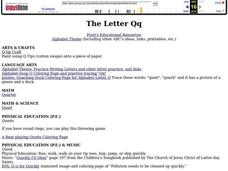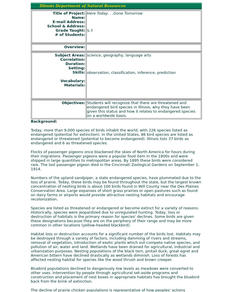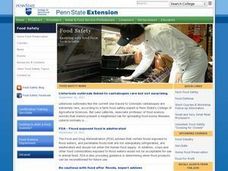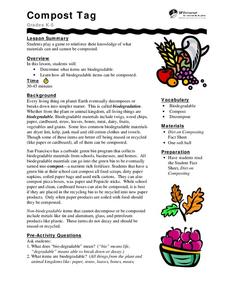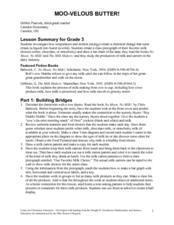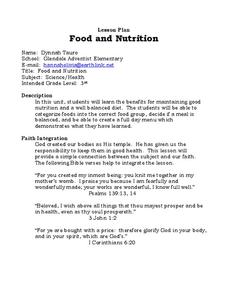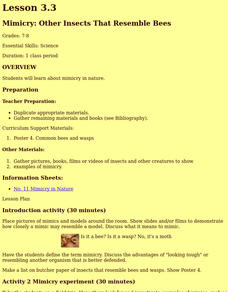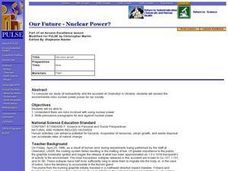Curated OER
Cows, Worms, and Compost
Students study decomposition. For this decomposition lesson, students discuss the background information about decomposition. Students then complete the 'Chew It Twice' worksheet.
Curated OER
Compost Tag
Students identify biodegradable items. In this environmental lesson, students participate in a game of tag. A student's name is called out along with a biodegradable item and the student is tossed a ball.
Curated OER
The Letter Qq
Young scholars complete a variety of activities to examine the uses for the letter Q. For this letter theme lesson, students complete arts and crafts, language arts, math, physical education, music, science, home economics, social...
Curated OER
Here Today. . .Gone Tomorrow
Learners observe that there are threatened and endangered bird species in Illinois, why they have been given this status and how it relates to endangered species on a worldwide basis. they participate in the Project WILD "Oh, Deer" or...
Curated OER
Farm * Examination 2
In this assessment, 10th graders Match the vocabulary terms in column A with the definitions in column B. Write the letter of the definition in column B in the space next to the terms in column A. Upon completionof the first task,...
Curated OER
Farm Products Help Me Grow
Students view a display of empty food containers (or illustrations). They select a food and decide as a class if it has an animal or plant origin. Students view a display of common farm animals that are commonly eaten (cow, pig, chicken,...
Curated OER
Fishing for Foods
Young scholars practice using the food pyramid and know which food group familiar foods belong in.
Curated OER
Climbing the Pyramid
Students examine the Food Pyramid to discover the foods they need to eat to have a healthy body. Using food brought to class, they must place the food in the correct category in the pyramid. In groups, they test food samples for fat...
SF Environment
Compost Tag
Composting is a great way to get children involved in recycling. First, they discuss how biodegradable products decompose to make compost. Then, they talk about what can and cannot be composted. They play a game similar to around the...
Curated OER
Moo-Velous Butter!
Third graders investigate how temperature and motion (energy) create a chemical change that turns cream ( a liquid) into butter (a solid). They create a class pictograph of their favorite mils choices (white, chocolate, or strawberry)...
Texas Heart Institute
Nutrition: How Do I Choose the Right Foods?
Young learners discuss how to practice healthy eating habits and the body's need for energy through discussion and exploration of the MyPlate system.
Curated OER
Snacks 'R Us
First graders experiment with fat content by analyzing snack foods. They learn what makes up a nutritious snack.
Curated OER
A Trip To the Animal Fair
Students share their experiences they have had with animals. Using photographs of their own pets, they create a booklet out of construction paper in which they identify the pets needs. They also compare and contrast what they need to...
Curated OER
Organic Farming / Agriculture
Want an organic farming resource packed with experiments, background information, science fair projects, and topics of interest for further research? Here it is. Young environmental scientists can explore concepts involved in organic...
Alabama Learning Exchange
Classification
Learners examine why scientists classify living organisms. They list and classify items they buy at the grocery store, sort and classify leaves, explore various websites, and write a biography of Carolus Linnaeus.
Curated OER
Stopping Decay
Students review reasons why teeth are necessary, define tooth decay, discuss and list ways to prevent tooth decay, name at least two foods that promote dental health, watch video Tooth Wisdom, and complete worksheet Tooth Healthy Snacks.
Curated OER
It's all In the Package
Students examine the concept of reducing solid waste and how it relates to product packaging. They read about and evaluate the packaging decisions of two major U.S. corporations, develop a t-chart comparing the pros and cons of various...
Curated OER
Learning About Composting
Students can create a compost pile to learn about the decomposition process.
Curated OER
How Many Trees Can You Grow?
Students solve a story problem about how many trees can be planted in a given area. Using a map, they gather information about the size of the area and the dimensions of an acre. They use a specific equation to determine the area of...
Curated OER
Introduction to Farming in the United States
Students discuss basic foods and what constitutes a well-balanced meal. They identify four basic food groups, and identify food sources, such as farms.
Curated OER
Dietary Guidelines 2000
Students research dietary guidelines and create a Microsoft Powerpoint presentation that reviews the dietary guidelines to present to their class or an elementary class.
Curated OER
Food and Nutrition
Third graders discuss the benefits for maintaining good nutrition and a well balanced diet. They categorize foods into the correct food group, decide if a meal is balanced, and create a full day menu which demonstrates what they have...
Curated OER
Mimicry: Other Insects That Resemble Bees
Learners design a conceptual experiment to test whether mimics actually benefit from the fact they resemble other organisms or objects. They define the term mimicry. They focus on insects that resemble bees and wasps.
Curated OER
Our Future - Nuclear Power?
Learners comprehend that there are risks involved with using nuclear power. They write persuasive paragraphs for and against nuclear power. Students analyze the environmental issues and risks with nuclear power.




